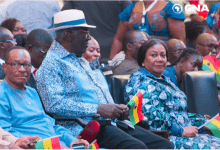
Professor Kwaku Asare, a Democracy and Development Fellow in Public Law and Justice at the Centre for Democratic Development-Ghana (CDD-Ghana), has posited that Articles 8(2) and 94(2a) of the 1992 Constitution have been misinterpreted for years as far as the application of the law on dual citizenship and allegiance are concerned.
He explained that there was a fundamental difference between the two articles in relation to persons seeking to occupy public positions adding that “they (Article 8(2) and 94(2a)) are different and relate to different issues, unfortunately, they have not always been read correctly,” Prof. Asare contended.
Article 8(2) of the Constitution states: Without prejudice to Article 94(2)(a) of the Constitution, no citizen of Ghana shall qualify to be appointed as a holder of any office specified in this clause if he holds the citizenship of any other country in addition to his citizenship of Ghana.
Article 94(2a) on the other hand, states: A person shall not be qualified to be a Member of Parliament if he owes allegiance to a country other than Ghana.
Prof. Asare’s explanation comes on the back of a promise made by former President John Mahama in relation to the dual citizenship law while some politicians, such as Adamu Dramani Sakande, and James Gyakye Quayson have fallen victim to the Articles in question.
But the former president, while addressing some members, supporters and delegates of the party promised to review the constitutional provision that prevents Ghanaians with dual citizenship from holding political positions in the country.
However, Prof. Asare bemoaned Article 8 was provision from old, unamended Constitution that barred dual citizenship in the regime in which it was provided and old Article 82 did not even allow dual citizenship and Article 94(2a) also had nothing to do with dual citizenship.
“One of the arguments used to support ban in outdated Constitution is ambiguity around allegiance of people with dual citizenship but rebuttal case was presented to Parliament in 1996 to prove questions raised about dual citizens’ and allegiance were unfounded which led to amendment to the Act to allow dual citizenship.
“Under Article 8(2), there are some limitations imposed on dual citizens because there are some offices dual citizens are not allowed to hold but those limitations are quite different from burden imposed by Article 94(2a) which deals with allegiance and not dual citizenship.
“Allegiance, as defined by the Constitution, pertains to citizen holding occupations that are incompatible, for instance, Ghanaian doubling as spy for foreign country to buttress explanation of allegiance I have given,” Prof. Asare posited.






